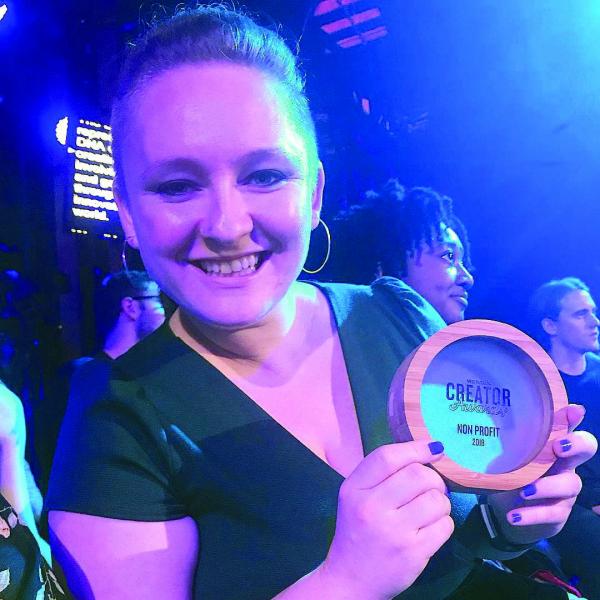October 11, 2018

Founder Maria Vertkin at the WeWork Creator Awards in September.
A Dorchester-based nonprofit is poised to make a leap to the national stage after winning a $72,000 grant last month at the WeWork Creator Awards in Nashville, TN.
Found in Translation, which helps homeless and low-income immigrant women unlock their multilingual potential by training them as medical interpreters and preparing them for employment at Boston’s prestigious hospitals and medical centers, moved its headquarters from Cambridge to Fields Corner last year.
The idea, says founder Maria Vertkin, is to lift women out of poverty and meet a need in the labor market. “It’s a very universal need,” she said, “because everywhere there are patients who need access to healthcare but don’t speak the dominant language, and everywhere there are multilingual people who would be great in that job if only they could access the training and the career path. And so that’s kind of an elegant model of taking two problems and allowing them solve each other.”
Vertkin, 32, was inspired to start the company by her experiences as an immigrant whose family struggled to begin a new life in America. As a social worker helping families and women with similar stories to her own, she saw how many new Americans were impacted by language barriers.
“This is the land of opportunity, but it’s also the land where surgeons come to become cleaning ladies,” said Vertkin. “That happens a lot, and as a result a lot of bilingual people, a lot of immigrants are trapped in poverty, where the only jobs accessible to them are jobs where they’re not paid very well, where they’re replaceable, and you know, they just basically stay poor forever. But if they’re bilingual, that’s a very marketable skill, if you dress it up right.”
Found in Translation offers its semester-long Language Access Fellowship program at no charge to candidates for interpreter certification. They go through a rigorous curriculum of more than 100 hours of skills-based and practical training. After graduating, the new interpreters are provided job-placement support through the nonprofit’s connections to Boston-area hospitals and medical centers, where they make around $25 an hour in an entry level position.
The organization also offers support services such as transportation assistance and onsite child care to eliminate some of the obstacles faced by homeless and low-income women looking to become certified. But earning a spot in the program isn’t easy: Each year, the organization must take an applicant field of anywhere from 250 to 500 women and whittle it down to a class of 35.
“It’s really hard,” said Vertkin. “You pick that 35 and there’s another at least 35 that would have been equally as successful, and equally as qualified.”
Vertkin is planning to expand in order to meet the high demand sector that her organization finds itself in, both training potential interpreters and contracting their services out to local medical centers. And she’s hoping that her recent trip to Nashville as a semi-finalist in the WeWork Creator Awards, an international initiative that provides funding to entrepreneurs, will help elevate her organization’s profile even further. In fact, she says, she has already received inquiries from out of state and as far as Kenya and the UK.
“Some providers don’t understand the role that language plays, and they’re very quick to take away confidentiality rights or not seek consent,” she said in noting that many doctors dehumanize immigrant patients by declining to communicate through an interpreter. “We need to get language access as part of the culture. It’s not a preference, it’s [a] legally protected right. When you take away language, that’s no longer medicine – that’s veterinarianism.”
First steps in the expansion process will involve doubling the size of the program, implementing a 35-student semester-long course in the spring and another in the fall. But Found in Translation’s victory at the semi-final in Nashville puts the company in the running for the global final, set to take place in early 2019, where winners take home up to a million dollars.
“That’s kind of a new achievement for us, feels like a ceiling being shattered,” Vertkin said.


